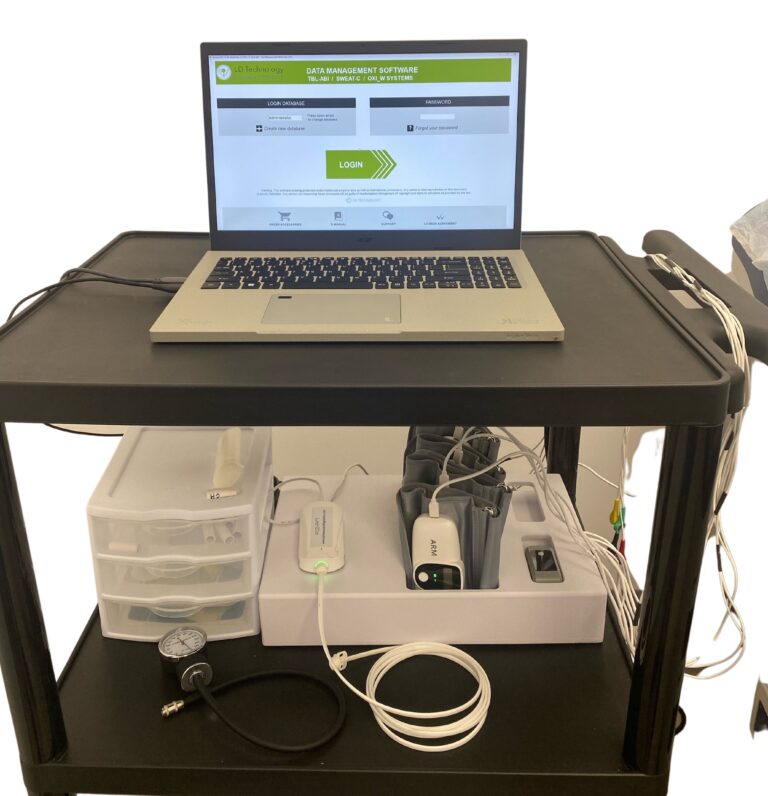FDA-cleared ERP/EEG testing that helps primary care clinicians assess brain function with objective, reproducible data.
Early cognitive complaints often present as slowed thinking, reduced mental stamina, or difficulty with divided attention. Screening tools are useful, yet they are influenced by education, language, and patient engagement. In a primary care clinic, you need objective physiology you can obtain in the exam room and integrate directly into the chart. The COGNISION System delivers ERP and EEG testing that translates subjective complaints into actionable data for diagnosis and ongoing care.
Measuring Brain Function with ERP/EEG to Support Cognitive Assessment
The system records scalp EEG and time-locked brain responses to auditory stimuli. These signals reflect how the brain processes information related to attention and working memory during a standardized task, while resting EEG captures background activity. Results are presented in structured, customizable reports that you can interpret alongside the history, exam, and labs. For patients with mild cognitive concerns, this combination provides an additional physiologic lens without adding imaging or outside referrals at the first step.
In-Office Cognitive Testing Made Practical for Clinics
Setup is straightforward with a comfortable headset that typically takes five to ten minutes to position. Testing is performed in any standard exam room and usually completes within about an hour. The software produces intuitive reports at the end of the session, which supports same-visit discussion of findings and care planning. Practices can train technicians quickly and have access to live support at all times, which lowers adoption friction and helps maintain consistency across staff.
Distinguishing Normal Aging from Cognitive Impairment
It can be challenging to separate age-associated changes from early signs of impairment. The COGNISION® System provides in-office ERP/EEG testing that gives physicians a reproducible physiologic anchor to support clinical judgment. It is positioned for common concerns such as dementia, concussion, and mild cognitive impairment, and it allows for longitudinal tracking of cognitive change over time. By trending results, clinicians can more confidently determine whether a patient’s symptoms reflect stable aging or evolving impairment and integrate findings with history, cognitive screens, and caregiver input to guide next steps.
Using Cognitive Testing Results to Guide Clinical Decisions
Cognitive testing results are most valuable when considered as part of a comprehensive evaluation. The COGNISION® System generates standardized, customizable reports that can be interpreted alongside history, physical exam, and laboratory findings. Results should also be viewed in the context of medication use, mood and sleep patterns, sensory deficits, and metabolic contributors. When findings align with ongoing symptoms, physicians can document objective physiology and define next steps such as closer monitoring, risk-factor optimization, or referral.
Documenting and Tracking Cognitive Change Over Time
Because testing and reporting occur in-office, results can be incorporated into the note immediately and used to establish a baseline for comparison. Serial assessments allow physicians to demonstrate stability or progression with quantitative data that is straightforward to communicate to patients and families. This continuity strengthens care coordination when reports are shared with neurology, geriatrics, or other specialists, ensuring all providers have consistent objective data to guide decisions.
FDA-Cleared and Clinically Validated Cognitive Testing
The COGNISION® System has been validated in more than 30,000 tests and is FDA-cleared to measure synaptic activity related to cognitive function. It is listed on the Alzheimer’s Association website as a recognized medical device, and ERP testing is recommended by the American College of Occupational and Environmental Medicine for concussion assessment. By combining established neurophysiologic methods with an accessible, technician-operated workflow, the system delivers an evidence-based solution that is practical to implement in primary care.
Medicare Reimbursement and Flexible Financing Options
The COGNISION® System is Medicare reimbursable, with multiple CPT codes available to cover the full testing process. Practices report an average Medicare reimbursement per session, providing a clear pathway to financial sustainability. For clinics building a cognitive care program, flexible financing is also available, including seasonal options with deferred payments through a trusted partner. These details make it easier for practices to adopt the system while establishing protocols and patient volumes.
Integrating ERP/EEG Testing Into Routine Primary Care
For aging patients with early cognitive concerns, the COGNISION® System provides a standardized, in-office ERP/EEG assessment that augments clinical judgment. Results support documentation, guide follow-up decisions, and track changes over time. With brief setup and a technician-friendly workflow, testing can be incorporated into routine visits or dedicated cognitive evaluations without disrupting patient flow.
The COGNISION® System delivers objective brain-function data in a format that integrates directly with the clinical assessment and plan. In the context of mild cognitive impairment, it supports clearer decision-making, stronger documentation, and more confident longitudinal monitoring.
With FDA clearance, proven reimbursement pathways, and more than 30,000 completed tests, the COGNISION® System offers primary care practices a practical, evidence-based solution for in-office cognitive testing.
To learn more or schedule a demonstration, contact Primary Care Diagnostics today.






